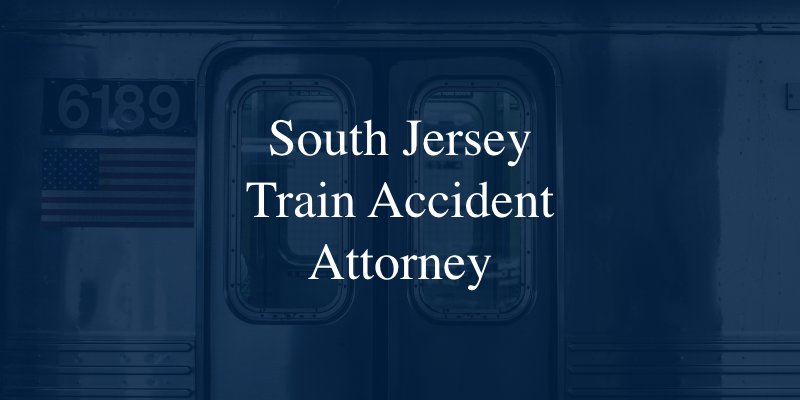South Jersey Train Accident Lawyer
Request a Free ConsultationNew Jersey is home to one of the nation’s busiest rail systems with around 172,000 riders on an average weekday, and common complaints of delays and overcrowding. In addition to raised fare rates and undesirable conditions, train derailments and other accidents are on the rise, with 742 train derailments in the U.S. in 2023, in addition to more common accidents like slip-and-falls, and struck-by accidents to passengers and employees.
If you or a close family member suffered injuries in a train accident in South Jersey, you may feel overwhelmed and uncertain where to turn when an injury claim for compensation involves a government entity like NJ Transit. Call the South Jersey accident attorneys at Grungo Law for the experienced legal counsel you need to obtain the maximum compensation available to you.
Why Choose Grungo Law for Your Train Accident Claim in South Jersey?

Compensation claims against government agencies can be complex and involve different timelines and requirements than car accident and personal injury claims. The attorneys at Grungo Law have years of experience navigating this type of accident claim. We offer the following important advantages in your train accident case:
- Lead attorney, Richard Grungo Jr. ESQ earned a rare New Jersey Supreme Court certification as a Civil Trial Lawyer
- A legal team with decades of combined experience working behind the scenes as well as an attorney dedicated to your case
- A formidable history of success in recovering over $135 million for injury victims in South Jersey
- An approach that prioritizes an individual strategy for each client using classic injury victim advocacy methods as well as leading technology
- Free initial consultations and contingency-based payment so you pay nothing until after we recover your compensation
Fortunately, most train rides end with a safe arrival at the destination, but it only takes one accident to send a life off-course. Injury victims suffer harm through no fault of their own in a train accident and shouldn’t be left responsible for the economic damages as well as the physical consequences.
Common Causes of Train Accidents in New Jersey
Trains in South Jersey carry both cargo and passengers, leaving crowded rails and busy workers. All employees working in various components of the train system must diligently adhere to regulations and take all reasonable measures to avoid causing a train accident or on-board injuries. Most train accidents result from the following:
Negligence:
If one or more of the many parties involved in safe train operation is negligent in their duties, the results can be devastating. A negligent party in a train accident could be the conductor, an employee, the railroad company, or train and track maintenance agencies. In some cases, negligent actions stem from human error. For example, operator distraction, a conductor who forgets to generate a signal warning or fails to adjust the train’s speed for the track conditions.
Reckless Drivers:
One of the most common causes of train derailments is a driver’s reckless actions when drivers attempt to beat a train crossing or ignore warning lights and gates. In some instances, drivers or pedestrians choose to commit “suicide by train” resulting in a derailment or collision.
Track Obstructions
Stalled vehicles, animals on tracks, and construction equipment obstructing a train’s passage are common causes of train accidents in South Jersey and elsewhere.
Mechanical and Engineering Failures:
Signal failures, track defects, poorly designed parts, and mechanical defects in crucial train components sometimes cause train accidents. Collapsed tunnels and bridges, explosions, and improperly secured or unbalanced cargo are other common causes of train accidents.
Some train accidents occur without a collision or major derailment. When crowded aisles, defective seats, or a strong bump or swerve cause a slip-and-fall accident or a falling-object injury, the injury victim may recover compensation.
Who Is at Fault for a Train Accident in South Jersey?
It takes a skilled investigation to determine fault for a South Jersey train accident. Depending on the circumstances of the accident, the at-fault party could be a state transit agency, the train company—the train company is typically liable for damages in an accident caused by one of their employees—a negligent train maintenance company, a negligent track maintenance company, a reckless driver, or the manufacturer of a defective train part.
Proving liability in a train accident requires showing that the at-fault party owed a duty of care to train passengers, they breached their duty through negligence or recklessness, their breach of duty directly caused the train accident, and the injury victim experienced damages from the injury.
Once an injury victim’s attorney has gathered evidence of liability they present the evidence to the appropriate party’s liability insurance and then begin negotiating for a settlement. If the insurance company does not offer an adequate settlement, the case may proceed to court for a jury to decide.
What Types of Injuries Occur in Train Accidents?
Trains move at substantial speeds and require long braking times, increasing the chances of an accident if one or more parties do not take all reasonable measures and practice due diligence. Injuries in train accidents range from mild to catastrophic or fatal. Common injuries named in train accident claims in South Jersey include the following:
- Head injuries/traumatic brain injuries
- Fractures, including of the limbs, ribs, hips, and pelvis
- Back injuries
- Neck injuries
- Soft tissue injuries to shoulders, knees, wrists, and ankles
- Spinal cord injuries
- Internal organ damage
- Burns
- Chemical exposures
- Lacerations
- Contusions and abrasions
Injuries are expensive as well as painful, especially if they are serious enough to interfere with the victim’s ability to work. Speak to an injury lawyer in South Jersey for more information.
What Damages Can I Recover in a South Jersey Train Accident Claim?
Damages in injury claims are divided into two categories: economic and non-economic. Economic damages after a train accident often include:
- Hospital bills
- Future medical care for ongoing injury treatment, scheduled procedures, rehabilitation, or home health aides
- Lost wages
- Future income loss
- Diminished earning capacity due to disability
Non-economic damages are intangible and more difficult to assign a monetary value, but because they are the worst aspect of the injury to most train accident victims, awarding financial compensation is the civil court’s way of delivering justice to injury victims. Common non-economic damages in train accidents include:
- Pain and suffering
- Disfigurement
- Loss of limb
- Loss of one of the senses
- Organ damage or loss
- PTSD and other emotional damages
- Diminished quality of life
- Loss of enjoyment of life
If a train accident causes the death of a loved one, a close family member may recover compensation through a South Jersey train accident wrongful death case.
Call the Experienced Train Accident Lawyers at Grungo Law
Don’t take on a complex personal injury claim after a train accident without experienced legal representation to provide counsel and guidance throughout the process. The skilled attorneys at Grungo Law are ready to help. Contact our South Jersey train accident lawyers today so we can action on your behalf.
